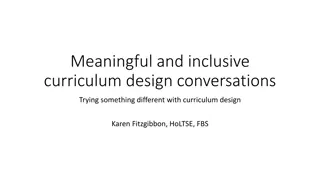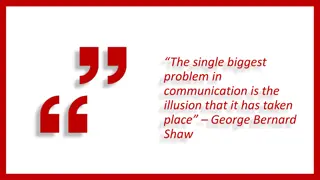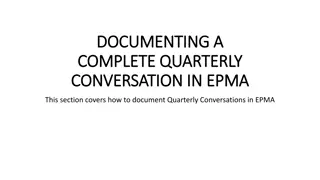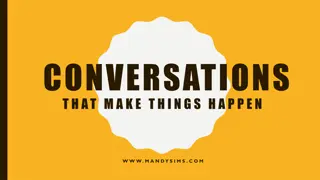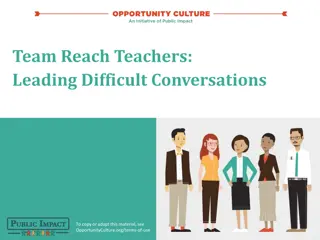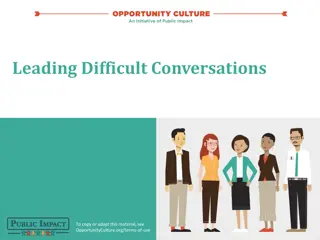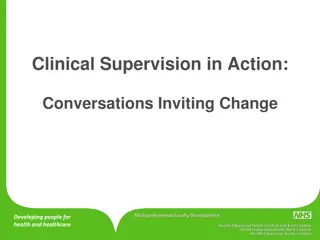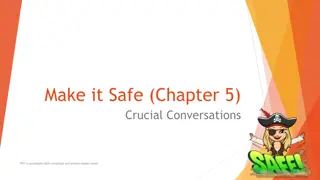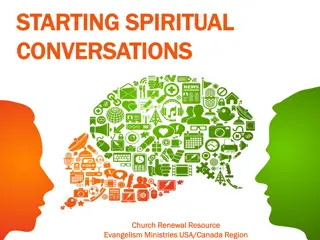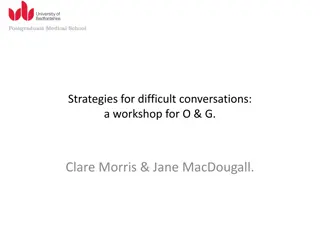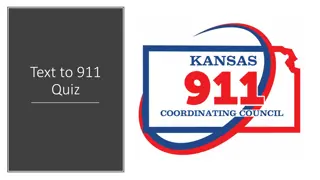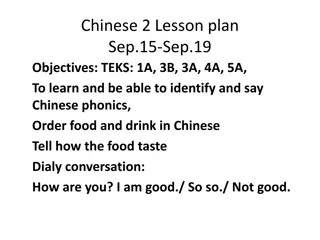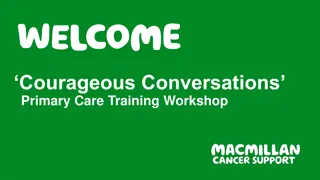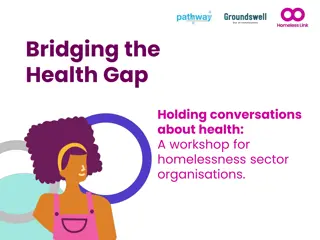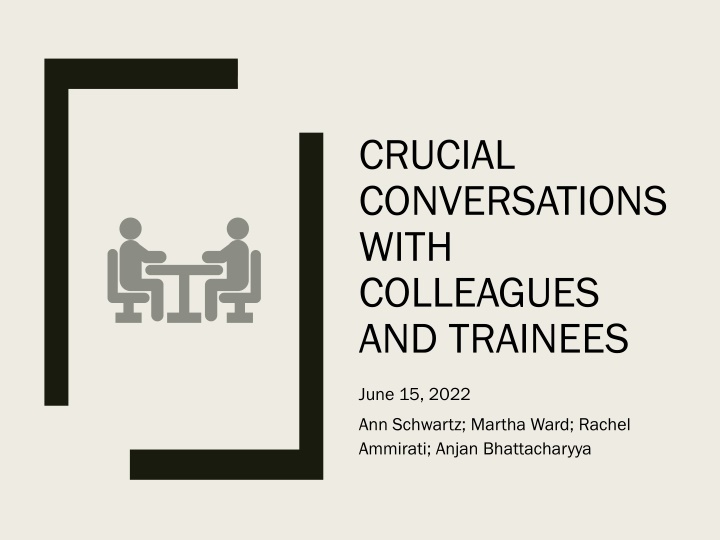
Recognizing Signs That a Crucial Conversation is Necessary
Learn to identify signs indicating the need for a crucial conversation within professional settings, such as performance concerns, high emotions, and avoidance of issues. Discover examples of crucial conversations and lessons learned for effective communication with colleagues and trainees.
Download Presentation

Please find below an Image/Link to download the presentation.
The content on the website is provided AS IS for your information and personal use only. It may not be sold, licensed, or shared on other websites without obtaining consent from the author. If you encounter any issues during the download, it is possible that the publisher has removed the file from their server.
You are allowed to download the files provided on this website for personal or commercial use, subject to the condition that they are used lawfully. All files are the property of their respective owners.
The content on the website is provided AS IS for your information and personal use only. It may not be sold, licensed, or shared on other websites without obtaining consent from the author.
E N D
Presentation Transcript
CRUCIAL CONVERSATIONS WITH COLLEAGUES AND TRAINEES June 15, 2022 Ann Schwartz; Martha Ward; Rachel Ammirati; Anjan Bhattacharyya
What are signs that a crucial conversation is needed? Performance or professionalism concerns Differences of opinion High emotions Avoidance of the issues You know when you know
What are signs that a crucial conversation is needed? Professionalism complaints Not meeting expectations for progress Signs of psychological distress Critical incident
What are signs that a crucial conversation is needed? External signs Observable work-related performance/behavior problems Observable tension or awkwardness in interactions (verbal or nonverbal); rupture in a relationship Colleague or trainee requests/hints at wanting feedback Internal signs Feeling particularly emotional about something Having the urge to avoid/put off a conversation
What are signs that a crucial conversation is needed? Repeated concerning behaviors, concerns raised Even one incident of significantly concerning behavior Repeated conflicts/disagreements Keep in mind: Peers may not report concerns Complaints may be the tip of the iceberg
What are some examples of crucial conversations you ve had (that either did or did not go well), and what did you learn? Examples related to the trainee disciplinary process Lack of objective data Lack of insight (trainee) Utilize self-assessment and multi-source evaluation Keep feedback bidirectional Look for patterns Limit the number of feedback items Interpersonal style contributions Lessons learned Intervene early Document, document, document Be familiar with and adhere to relevant policies Involve others (training director, chair, GME, legal)
What are some examples of crucial conversations you ve had (that either did or did not go well), and what did you learn? I don t need a teacher. I just need the information I m not satisfied with my career Debrief after death of a patient
What are some examples of crucial conversations you ve had (that either did or did not go well), and what did you learn? Providing feedback to a trainee about her interpersonal style Key learning: give feedback early/in a collaborative way; clarify our roles/clearly state goals of conversation; consider developmental level; put myself in the other person s shoes; instill hope Addressing tension in supervision with a trainee Key learning: diversity of academic cultures; ask for/encourage feedback on my approach Providing feedback to a primary care colleague about being too pushy with a patient Key learning: prepare adequately/set clear goals ahead of time; awkward conversations can lead to growth for both parties
What are some examples of crucial conversations you ve had (that either did or did not go well), and what did you learn? Discussion with a struggling resident, who needed remediation Smart people can have poor insight into obvious problems Follow up conversations can be necessary once people have had time to process and develop questions Discussion with faculty who was getting negative teaching evaluations Helpful to demonstrate that you see value in the person While identifying specific behaviors that are causing problems
What strategies do you use to prepare for, conduct, and follow up on crucial conversations, and how do you incorporate cultural sensitivity? Preparation Strategies Gather the information needed Be clear on goals of the conversation Have specific examples (be detailed and concise) Consider involving others in the conversation Practice! Conducting difficult conversations Make your conversation a dialogue, hear both sides Reaction and outcome strategies (manage yourself) Allow for feedback, brainstorm solutions together Be aware of your own biases Follow-up Provide resources (mentorship, support, etc.)
What strategies do you use to prepare for, conduct, and follow up on crucial conversations, and how do you incorporate cultural sensitivity? Don t wait Outline facts/talking points Need to be in person Be direct Openly show your emotional investment Admit what you don t know/might be assuming
What strategies do you use to prepare for, conduct, and follow up on crucial conversations, and how do you incorporate cultural sensitivity? Preparation Clarify & be specific about concern(s)/avoid kitchen sinking Set specific goal(s) for conversation Avoid the FAE/consider role of other biases and power dynamics Imagine myself in the other person s shoes Consider my strengths/weakness related to handling the topic & consulting a peer or someone more experienced Conduct Don t beat around the bush ; clearly outline concerns/goals Encourage feedback during conversation Invite dialogue/be open to being wrong/use collaborative approach Agree on a clear plan of action, including a plan for follow up Follow up Stick to the plan
What strategies do you use to prepare for, conduct, and follow up on crucial conversations, and how do you incorporate cultural sensitivity? Obtain as much information about the situation as you can Reach out to those directly involved Decide level of intervention required Cup of Coffee conversation Consider neutral territory Be open to hearing their side of story Be clear in advice, and description of expectations Formal intervention Consider having a third party present Develop a performance improvement plan using EDICTS format Follow up documentation letter or email
E = the expectations expectations you have for their performance/behavior D = the way they have deviated deviated from those expectations I = the improvement improvement you are requiring of them C = the consequences consequences of failing to meet the expectations or improvement plan T = the timeline timeline by which you expect improvement S = the surveillance surveillance, or the way that you will judge that they have improved

